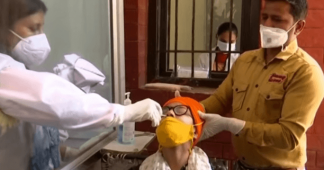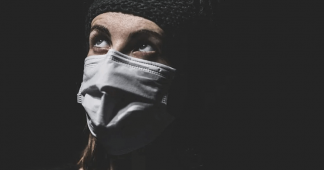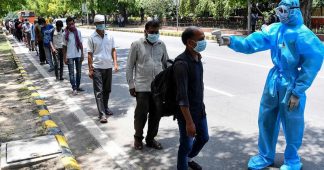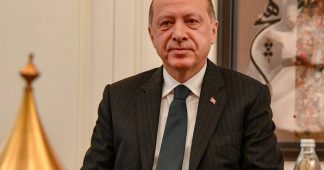As humanity faces a new upsurge of the pandemic driven by more contagious coronavirus variants, Asia is emerging as the world’s worst-hit region. Forty percent of the world’s over half-million reported daily cases of COVID-19 are now in Asia, where vaccination has barely begun. Moreover, nearly 90 percent of these cases are in a swathe of countries in the Middle East and the Indo-Pacific where, virtually from one week to the next, infections are exploding, shattering previous records.
However calls for medically-guided lockdowns and social support for those unable to work to halt this new, even deadlier upsurge of the virus invariably run into implacable opposition from governments across Asia.
In India, daily infections have doubled since late March to over 120,000, the highest in the world, and nearly half of Asia’s 260,000 cases. Yet Prime Minister Narendra Modi’s government is adamantly opposed to calls for a nationwide lockdown, or even the closing of non-essential businesses in the worst affected states. Instead, Modi and his Hindu supremacist BJP boast of mounting “the world’s largest vaccination drive.” To date, India has administered the world’s third highest number of vaccine shots. But fewer than 6 percent of Indians have received a single dose of a vaccine, and just 0.8 percent are fully vaccinated.
As India crosses the threshold of 13 million cases and 167,000 deaths, its underfunded health system is on the brink of collapse. A double variant, which combines mutations akin to the South African and US West Coast variants, is spreading, along with the B.1.1.7, or UK, variant. In Mumbai, India’s financial capital, Dr. Lancelot Pinto told the BBC that every few minutes he must refuse calls from desperate families seeking an emergency care bed for their loved ones: “We are already overrun. All COVID-19 beds in my hospital are full.”
A hysterical campaign is underway among India’s ruling elite to oppose even partial local lockdowns. The Times of India denounced them as “a cure truly worse than the disease,” in an editorial Tuesday. Meanwhile Jai Ambani—the son of a billionaire and the nephew of Asia’s richest man, Mukesh Ambani, with a fortune of $83.1 billion—tweeted that lockdowns “destroy the very backbone of our society and economy” and are a “totalitarian” attempt to “control every aspect of your life.” This confirms the British Medical Journal’s characterization of the US, UK and Indian ruling elites’ pandemic policy as “social murder.”
Turkey saw a record 54,740 cases of COVID-19 and 276 deaths from the disease on Wednesday, with the number of active cases quadrupling to 406,004 since March. Child intensive care cases are rising rapidly, with an estimated 75 percent of new cases caused by the B.1.1.7 variant. Turkish Intensive Care Society chair Professor İsmail Cinel has warned that Turkey’s intensive care units will be full within 10 days. Only 8.7 percent of Turkey’s population and 10 percent of educators are fully vaccinated.
Nonetheless, President Recep Tayyip Erdoğan has kept tens of millions of workers on the job in non-essential industries while lifting social distancing measures—ending weekend curfews, and reopening schools and cafés. The Istanbul Medical Chamber branded this policy as a “fiasco,” and the Turkish Medical Association (TTB) tweeted: “There is no rational, scientifically-based struggle against the pandemic. … Insisting on wrong health policies is social murder.”
Iran saw a record 20,954 new cases of COVID-19 on Wednesday and 193 deaths—a figure that has doubled in one week, as the UK variant spreads. With a record 4,200 intensive care beds occupied in Tehran, one doctor told Le Monde: “Public hospitals are full, urgent care wards have no more space. Patients are treated lying on the ground or wait days for a bed.”
Facing devastating US economic sanctions, Iran—a country of 83 million—has received only a few hundred thousand doses each of Chinese, Russian and South Korean vaccines. Citing the impact of US sanctions and war threats, President Hassan Rouhani refused to order a lockdown, stating that its economic impact could trigger mass protests of workers: “The easiest would be to stop everything. But after that, the people, facing hunger, poverty and unemployment, would go into the streets.”
Iraq—whose health infrastructure has been shattered by decades of US-led wars, bombings, and sanctions since the 1991 Gulf War—saw a record 8,331 new cases Wednesday. As infections near 1 million, with only 119,000 vaccine doses administered in a country of 39 million people, Save the Children is warning that hospitals could soon be flooded: “There are worrying signs that COVID-19 is taking a heavy toll in Iraq. … We are worried that the new variant will start spreading undetected among children. It could be a matter of time before Iraq’s healthcare system is overwhelmed.”
In the Philippines, new daily cases surged from 2,065 on March 2 to 15,280 on April 2. The number of active cases, now at around 160,000, is more than double the earlier peak of 79,800 last August. Manila and its surrounding provinces have 70 percent of Filipino cases, and intensive care beds are already 79 percent occupied in the National Capital Region, 26 of whose 150 hospitals are fully occupied. However, President Rodrigo Duterte has decided to channel US$19 billion of desperately-needed public funds into paying off state debts to major investors.
In Bangladesh, a global textile center where garment workers earn only a few dollars per day, daily infections have surged from 606 to 6,854 in a month. The state has declared a lockdown, but only for a week. Meanwhile, it is forcing workers to stay on the job to satisfy fashion conglomerates based in the imperialist countries, who dominate Bangladesh’s economy. Only 5.5 million vaccine doses have been administered in this country of 163 million, which has seen 666,132 cases of COVID-19.
Significantly, Asia also provides examples showing that a scientific social distancing policy can halt the virus while mass vaccination prepares its eradication. China, the initial epicenter of the pandemic, has reported 3,270 COVID-19 cases and two deaths in all of 2021, mainly as a result of travelers bringing the virus back into the country. Similarly, Taiwan has reported 246 cases including 3 deaths this year, and Vietnam reported 1,174 cases, but no deaths.
The successes of the few countries that have halted the virus expose the bankruptcy and criminality of the “herd immunity” policies pursued not only in the rest of Asia, but in the imperialist centers of North America and Europe. Their governments have systematically prioritized profit over human lives, insisting on opening businesses and schools as the pandemic runs rampant. While China’s 1.4 billion people have suffered less than 5,000 COVID-19 deaths, the NATO countries’ 941 million have suffered over 1.4 million deaths.
The re-importing of the coronavirus into countries where it is under control underscores an essential political point. The fight against this constantly-mutating virus, which ignores borders and needs no passports, is international. It cannot be stopped in one country, or even on one continent, but only across the world. Stopping it requires, however, an international struggle against capitalism.
Claims that there is not enough money to end “herd immunity” policies, fund social distancing, rapidly make vaccines, and halt the pandemic are lies. This last year, the world’s billionaires added $5.1 trillion in wealth to the $8 trillion they already owned, as central banks in the imperialist centers pumped trillions of dollars, euros, pounds and yen in public funds into the financial markets. India’s three richest billionaires added US$100 billion to their wealth last year, while Turkey’s 26 billionaires increased their collective wealth to $53.2 billion.
At the same time, countries across Asia and the world are plunging trillions of dollars into preparing for war. NATO countries are to spend over $1 trillion on their militaries this year. India, which budgeted just US $8.4 billion for health care last year, spent $66 billion on its military in 2020, while integrating itself ever more fully into Washington’s military-strategic offensive against China, including through the US-led Quad strategic partnership with Australia and Japan. Turkey spent $19 billion on its military, including on the continuing NATO war in Syria.
Were these sums to be expropriated, they, together with the even larger fortunes held by the financial aristocracy in the imperialist centers, could provide humanity with the resources needed to halt the pandemic and avert tens of millions of unnecessary deaths.
But this requires the mobilization of the working class in revolutionary struggle against imperialism, the reactionary capitalist governments across Asia, great-power conflict and war, and for socialism.
The globalization of production, over several decades, has brought over a billion peasants to cities across Asia, producing a vast and powerful working class. The last year has seen hundreds of millions participate in protest strikes or industrial action in India, wildcat strikes against “herd immunity” policies at major industrial plants in Turkey and Bangladesh, and mass social protests in Iran.
Halting the pandemic requires unifying this mighty force in struggle across its many regional, ethnic and sectarian divides, and welding it together with its class brothers and sisters in the imperialist powers and beyond, based on an international socialist program to reorganize economic life based not on private profit, but social need.
Published at www.wsws.org











